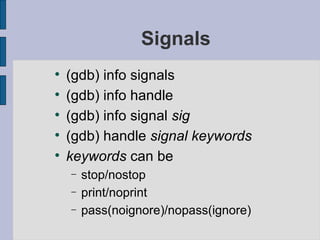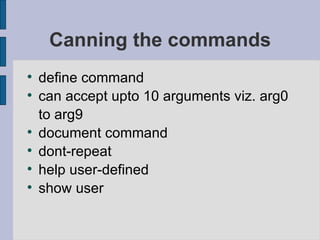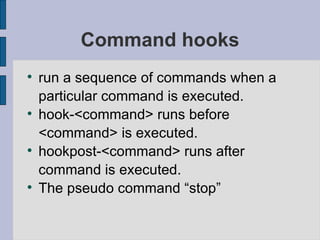Debugging Applications with GNU Debugger
- 1. Debugging applications with the GNU Debugger Presenter: Prakash Varandani
- 2. When to use a debugger? Point-in-time debugging When a problem is easily reproducible. When the problem behavior can be predicted When a problem can be localized to a small period of time When system level problem determination tools do not help When the source code is readily available.
- 3. When not to use debugger? When causes of a problem span a long history and time. Problem is difficult to predict in nature. Problem is not reproducible at will.
- 4. Why gdb? Easily available. Easy installation. Configurable. Support for various Object File Formats. Support for various architectures. Rich feature set. Open Source (Of Course).
- 5. Compiling for Debugging. Compiling with the “-g” option: e.g. gcc –g stack.c –o stack Preprocessor information: e.g. gcc –dwarf-2 –g3 stack.c –o stack
- 6. Attaching a process Run a program directly through the debugger. Attach to a running process. Use a core file for post-mortem analysis.
- 7. Invoking gdb Executable program: gdb program Executable and core file: gdb program core. Executable and process: gdb program <pid>.
- 8. Program’s arguments. (gdb) set args abc def (gdb) set args (gdb) run abc def Example 1:
- 9. gdb files It is possible to start gdb without any process/executable/core file. Add an executable (gdb) file/exec-file <executable> Attach to a already running process (gdb) attach <pid> Add a core file (gdb) core-file <filename>
- 10. Setting breakpoints: (gdb) break function (gdb) break +/- offset (gdb) break linenum (gdb) break filename : linenum (gdb) break filename : function (gdb) break * address (gdb) break ... if cond Example 2:
- 11. Setting breakpoints contd… (gdb) tbreak args (gdb) hbreak args (gdb) thbreak args (gdb) rbreak regex
- 12. Watchpoints (gdb) watch expr (gdb) rwatch expr (gdb) awatch expr (gdb) info watchpoints (provides similar information as for info breakpoints)
- 13. Getting information about breakpoints info breakpoints [ n ] Breakpoint Numbers Type Disposition Enabled or Disabled Address What Example 4:
- 14. Breakpoints contd… Simple breakpoints stop the program every time they are hit. (gdb) condition bnum expression (gdb) condition bnum (gdb) ignore bnum count (gdb) commands [ bnum ] ... command-list ... end If bnum is not provided the commands refer to the last set breakpoint/watchpoint.
- 15. Breakpoints contd... (gdb) clear (gdb) clear function (gdb) clear linenum (gdb) delete [breakpoints] [range...] (gdb) disable [breakpoints] [range...] (gdb) enable [breakpoints] once range (gdb) enable [breakpoints] delete range
- 16. Continuing and Stepping (gdb) continue [ignore-count] (gdb) step [count] (gdb) next [count] (gdb) finish (gdb) until (gdb) until location (gdb) stepi (gdb) nexti Example 5:
- 17. Examining the stack Frames: data associated with each function call like arguments, local variables, ra etc... The most recently created frame is called the innermost frame and the initial one is called the outermost frame. gdb assign numbers to the stack frames, 0 for the innermost and so on..
- 18. How we got there?.. backtraces backtrace, bt -> Print a backtrace of the entire stack. backtrace n , bt n -> print n innermost frames. backtrace - n , bt – n -> print n outermost frames. backtrace full -> Print the values of the local variables also.
- 19. Controlling backtrace set backtrace past-main [on/off] to configure printing of system specific code. set backtrace past-entry [on/off] show backtrace past-entry set backtrace limit n set backtrace limit 0 (unlimited) show backtrace limit
- 20. Selecting a frame (gdb) frame n, f n -> select frame n (gdb) frame addr , f addr -> useful when the program has multiple stacks (highly system specific). (gdb) up [n] -> for positive n move “n” frames towards the outermost frame. (gdb) down [n] -> for positive n move “n” frames towards the innermost frame. If n is not provided move one frame up or down.
- 21. Information about a frame (gdb) info frame This command prints a verbose description of the selected stack frame, including: the address of the frame the address of the next frame down (called by this frame) the address of the next frame up (caller of this frame) the language in which the source code corresponding to this frame is written the address of the frame's arguments the address of the frame's local variables the program counter saved in it (the address of execution in the caller frame) which registers were saved in the frame This information is useful when a stack format fail to fit the usual convention.
- 22. Information about a frame ... (gdb) info frame addr , info f addr (gdb) info args (gdb) info locals
- 23. Printing source lines (gdb) list linenum (gdb) list function (gdb) list (gdb) list – (gdb) list *address
- 24. Searching source files. (gdb) forward-search regexp following the last line printed, search for a match with regexp and print the first line found. (gdb) search regexp Same as forward-search. (gdb) reverse-search regexp Starting with the line one above the last line printed, search for a match with regexp and print the first line found.
- 25. Examining Data (gdb) print expr (gdb) print /f expr (gdb) print (gdb) print /f
- 26. Output formats x -> hexadecimal d -> signed decimal u -> unsigned decimal o -> octal t -> binary c -> character f -> floating point a -> address format
- 27. Examining memory (gdb) x /nfu addr (gdb) x addr n -> the repeat count. Default 1. f -> format for printing. Default x and changes eventually. u -> unit size, can be one of b -> byte h -> half word (2 bytes) w -> word (4 bytes) g -> giant word (8 bytes)
- 28. Automatic display (gdb) display expr (gdb) display /f expr (gdb) undisplay dnums delete display dnums (gdb) disable display dnums (gdb) enable display dnums (gdb) display (gdb) info display
- 29. Assembly Language Disassembling a function: (gdb) disassemble main Dump of assembler code for function main: 0x00010754 <main+0>: save %sp, -120, %sp 0x00010758 <main+4>: mov 3, %o0 0x0001075c <main+8>: st %o0, [ %fp + -20 ] 0x00010760 <main+12>: ld [ %fp + -20 ], %o0 0x00010764 <main+16>: call 0x10718 <fun1> 0x00010768 <main+20>: nop 0x0001076c <main+24>: clr %i0 ! 0x0 0x00010770 <main+28>: b 0x10778 <main+36> 0x00010774 <main+32>: nop 0x00010778 <main+36>: ret 0x0001077c <main+40>: restore End of assembler dump.
- 30. Looking into the registers A single register: (gdb) p $eax $4 = 6 (gdb) p $ecx $5 = 1 All of them: (gdb) info registers eax 0x6 6 ecx 0x1 1 edx 0x4015c490 1075168400 ebx 0x4015afd8 1075163096 … …
- 31. Signals (gdb) info signals (gdb) info handle (gdb) info signal sig (gdb) handle signal keywords keywords can be stop/nostop print/noprint pass(noignore)/nopass(ignore)
- 32. Altering Execution Assigning values to variables at runtime using print/set. Continuing at a different address Sending a signal Cancelling execution of a function Calling program functions
- 33. Canning the commands define command can accept upto 10 arguments viz. arg0 to arg9 document command dont-repeat help user-defined show user
- 34. Command hooks run a sequence of commands when a particular command is executed. hook-<command> runs before <command> is executed. hookpost-<command> runs after command is executed. The pseudo command “stop”













![Getting information about breakpoints info breakpoints [ n ] Breakpoint Numbers Type Disposition Enabled or Disabled Address What Example 4:](https://image.slidesharecdn.com/debugging-applications-with-gnu-debugger-4096/85/Debugging-Applications-with-GNU-Debugger-13-320.jpg)
![Breakpoints contd… Simple breakpoints stop the program every time they are hit. (gdb) condition bnum expression (gdb) condition bnum (gdb) ignore bnum count (gdb) commands [ bnum ] ... command-list ... end If bnum is not provided the commands refer to the last set breakpoint/watchpoint.](https://image.slidesharecdn.com/debugging-applications-with-gnu-debugger-4096/85/Debugging-Applications-with-GNU-Debugger-14-320.jpg)
![Breakpoints contd... (gdb) clear (gdb) clear function (gdb) clear linenum (gdb) delete [breakpoints] [range...] (gdb) disable [breakpoints] [range...] (gdb) enable [breakpoints] once range (gdb) enable [breakpoints] delete range](https://image.slidesharecdn.com/debugging-applications-with-gnu-debugger-4096/85/Debugging-Applications-with-GNU-Debugger-15-320.jpg)
![Continuing and Stepping (gdb) continue [ignore-count] (gdb) step [count] (gdb) next [count] (gdb) finish (gdb) until (gdb) until location (gdb) stepi (gdb) nexti Example 5:](https://image.slidesharecdn.com/debugging-applications-with-gnu-debugger-4096/85/Debugging-Applications-with-GNU-Debugger-16-320.jpg)


![Controlling backtrace set backtrace past-main [on/off] to configure printing of system specific code. set backtrace past-entry [on/off] show backtrace past-entry set backtrace limit n set backtrace limit 0 (unlimited) show backtrace limit](https://image.slidesharecdn.com/debugging-applications-with-gnu-debugger-4096/85/Debugging-Applications-with-GNU-Debugger-19-320.jpg)
![Selecting a frame (gdb) frame n, f n -> select frame n (gdb) frame addr , f addr -> useful when the program has multiple stacks (highly system specific). (gdb) up [n] -> for positive n move “n” frames towards the outermost frame. (gdb) down [n] -> for positive n move “n” frames towards the innermost frame. If n is not provided move one frame up or down.](https://image.slidesharecdn.com/debugging-applications-with-gnu-debugger-4096/85/Debugging-Applications-with-GNU-Debugger-20-320.jpg)




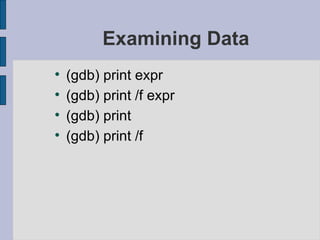


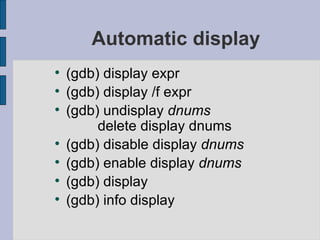
![Assembly Language Disassembling a function: (gdb) disassemble main Dump of assembler code for function main: 0x00010754 <main+0>: save %sp, -120, %sp 0x00010758 <main+4>: mov 3, %o0 0x0001075c <main+8>: st %o0, [ %fp + -20 ] 0x00010760 <main+12>: ld [ %fp + -20 ], %o0 0x00010764 <main+16>: call 0x10718 <fun1> 0x00010768 <main+20>: nop 0x0001076c <main+24>: clr %i0 ! 0x0 0x00010770 <main+28>: b 0x10778 <main+36> 0x00010774 <main+32>: nop 0x00010778 <main+36>: ret 0x0001077c <main+40>: restore End of assembler dump.](https://image.slidesharecdn.com/debugging-applications-with-gnu-debugger-4096/85/Debugging-Applications-with-GNU-Debugger-29-320.jpg)

